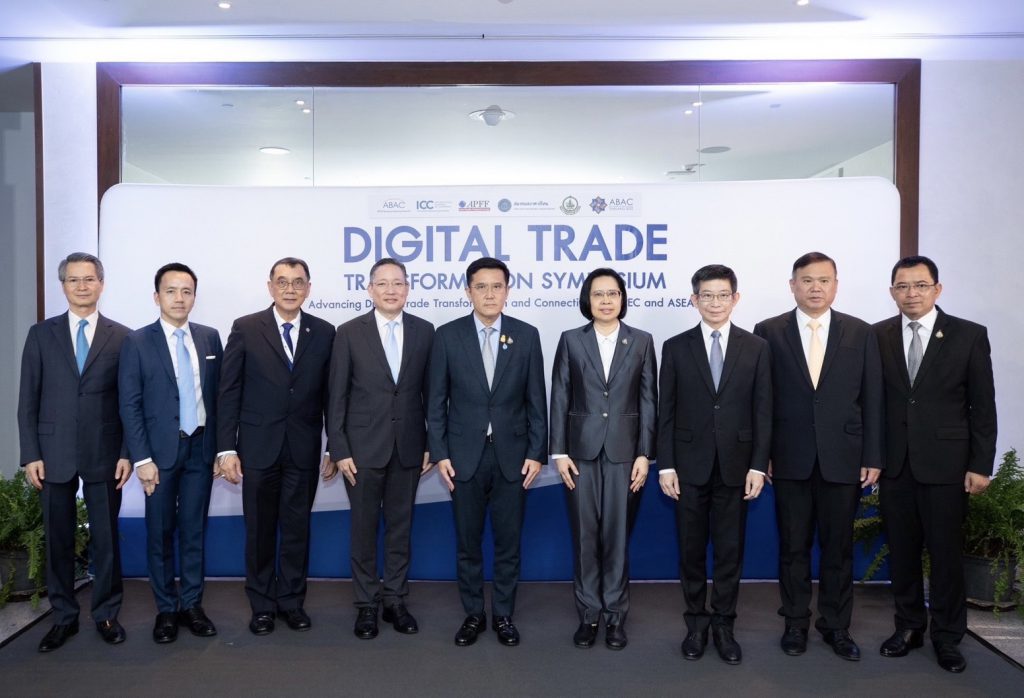JSCCIB announces the success of the first key milestone of Thailand NDTP

The NDTP project is driven and owned by the Joint Standing Committee of Commerce, Industry and Banking (JSCCIB), an apex body of the three core private organizations of the Thai business sector and has, the objective of improving efficiency of end-to-end export and import processes and increasing access to financing particularly for SMEs. A special sub-committee under the Office of the Public Sector Development Commission has been established to orchestrate various public sectors in supporting JSCCIB to drive the NDTP.
NDTP Phase 1 has been developed with blockchain technology and operated by National ITMX Company Limited (NITMX), the infrastructure service provider for payments in Thailand such as PromptPay. Recently, NITMX expanded its scope to develop and provide trade infrastructure as well as financing for banks including the Trade Document Registry (TDR) and PromptBiz. NDTP development has been supported by NITMX as this is one of the country’s trade infrastructures designed to strengthen Thailand’s competitiveness in the global trade industry. The legal and documentation components are supported by Baker McKenzie Thailand.
Proof of Concept/Pilot Live of Thailand NDTP 1st phase to digitize international trade documents and processes has been successfully completed thanks to the connectivity with TradeWaltz in Japan and Networked Trade Platform (NTP) in Singapore. Phase 1 is the critical milestone for Thailand to kick start international trade digitization. The scope includes implementation of standards, UNCEFACT, for electronic commercial documents including electronic purchase orders, electronic invoices and electronic packing lists.

The four POC transactions were executed by PTT Global Chemical Public Company Limited, Toyota Tsusho (Thailand) Co. Ltd., and Unicord Public Company Limited with their counterparties in Japan while the other two Pilot Live export transactions were executed by B.Food Product International Co. Ltd. of Betagro Group and Pacific Sugar Corporation Limited of Mitrphol Sugar Group with their counterparties in Singapore.
This Phase 1 also includes authenticity verification of the underlying document for financing by banks by way of connectivity between NDTP and TDR, the platform connecting international trade financing banks which has been operative in providing double financing checking for banks since early 2022. Participating banks in phase 1 NDTP/TDR include Bangkok Bank Public Company Limited, Bank of Ayudhya Public Company Limited, Kasikorn Bank Public Company Limited, Krungthai Bank Public, Siam Commercial Bank Public Company Limited, and TMB Thanachart Bank Public Company Limited.
The next step for Thailand NDTP is to establish a body to take what has been completed in Phase 1 forward, and continue the development and connectivity, in order to start offering services in the commercialization phases.

Mr. Chaiwut Thanakamanusorn, Minister of Digital Economy and Society said Thailand has launched a national digital trade platform, which would centralize and streamline import and export procedures to make Thailand even more competitive in trade, particular digital trade, by offering businesses the flexibility to excel in this new era of global commerce. This platform will improve ease of doing business, which is a crucial factor in order to attract foreign trade and investment to Thailand.

Mr. Payong Srivanich, Chair of the Thai Bankers’ Association and Co–Chair of JSCCIB said: “This achievement of NDTP Phase 1 is indeed a significant milestone in the digital transformation of Thailand’s international trade, which will make export and import easier, faster and more convenient for not only exporters and importers but also all other stakeholders. It will reduce time spent on preparing and processing documents. Banks will be able to verify supporting documents for financing more efficiently in addition to the existing double finance checking on TDR. This will increase access to financing for exporters and importers and in turn increase the competitiveness of Thai exports particularly for SMEs.”
“This Phase 1 success is a result of strong collaboration and cooperation between teams from the private and public sectors, and it has made Thailand one of the first countries in the region to make such progress in digital trade. I hope that this cross-country collaboration and connectivity will be expanded in both breadth and depth to the regional and global levels in order to promote equality in business and sustainable growth.”
Mr. Kriengkrai Thiennukul, Chair of the APEC Business Advisory Council (ABAC) 2022, Chairman of the Federation of Thai Industries (FTI) and the chairman of the Joint Standing Committee on Commerce, Industry and Banking (JSCCIB) said: “The importance of this NDTP project is helping the industrial sector, which is an important part of the country’s imports and exports, in being more efficient and competitive.
Currently, imports and exports of goods worth up to 17 trillion baht in 2021, play an important role in driving the country’s economy. This has been particularly true in the COVID era, where the export sector has been the main engine in driving the Thai economy.”
“Today, the import and export of Thai products still require a lot of procedures and documents. There are up to 20-30 entities involved per each import or export. This is very time-consuming and costly compared to many countries. Therefore, the JSCCIB has driven this project to facilitate business (Ease of Doing Business) and greatly increase the country’s competitiveness (Thailand Competitiveness) in line with the proposal of the APEC Business Advisory Council (ABAC) to the APEC (Letter to Leader) economic zone leaders who drive international trade with the Digital Technology (Cross Border Digital Trade).
In addition, the NDTP project can help SMEs access financial loans more easily. This is because the system will be connected to banks with the Trade Document Registry (TDR) system to verify the credibility of import and export data from the system and checks to prevent double financing using Blockchain Technology. This will allow financial institutions to reduce their risks and help SMEs access more funding sources (SMEs Access to Finance).”
Mr. Sanan Angubolkul, Chair of the Board of Trade of Thailand and Co–Chair of JSCCIB, said: “On behalf of the Board of Trade of Thailand, we are very pleased that the Thai private sector has successfully developed the first phase of the National Digital Trade Platform or NDTP and introduced the connection of the Proof of Concept with Japan’s Trade Waltz platform and Pilot Live with Singapore’s Networked Trade Platform or NTP.”
“This achievement is the result of strong cooperation between all relevant agencies, both public and private, to fully digitize our international trade practices. Benefits of this platform include reducing costs and time, improving the country competitiveness, as well as increasing both data security and transparency in the import-export processes.
The Board of Trade of Thailand has continuously supported the development of the NDTP platform and has committed to drive it to the next level by expanding the connectivity with other countries. Therefore, we would like to invite international trade communities, not only importers and exporters, but also bankers, logistics providers and insurance companies, to join the NDTP platform when ready. We strongly believe that NDTP will fully digitalize our country’s trading system and will definitely enhance Thailand’s competitiveness in the near future.”
Ms. Onfa Vejjajiva, Secretary–General of the Office of the Public Sector Development Commission, said: “The Office of the Public Sector Development Commission (OPDC) was assigned by the Cabinet to develop the NDTP platform by setting up the Public Sector Development Sub-Committee on Thailand’s National Digital Trade Platform comprising experts from relevant agencies, both the public and private sectors. The task was to jointly develop a prototype to test data linking accuracy when the system goes live to operate and enhance import-export information linking with the National Single Window (NSW) in which more than 36 government agencies are involved. Furthermore, improving laws and regulations reduce the digital trade obstacles. This includes the announcement of the Electronic-means Administrative Functions Act B.E. 2565 (EAFA), which aims to encourage government agencies to provide digital services to facilitate and build confidence for entrepreneurs to increase business growth and create competitive opportunities for all companies in the Thai private sector.
The OPDC will accelerate the development of NDTP platform following the model of public-private partnership (PPP), which brings together the strengths of the public and private sectors to work together. The NDTP platform is to be operational by 2024. Currently, it is in the investment feasibility study process that will allow the NDTP to respond to the needs and expectations of business sector and citizens.”
Mr. Kobsak Pootrakul, Chairman of the Sub-Committee of the Office of Public Sector Development Commission for NDTP, said: “A digital trade platform, as a part of digital trade transformation, is a key element to drive the digital economy for Thailand. Driving digital trade transformation is very complex. It requires a lot of time and effort by a large number of parties both government and private sectors, given the number of documents and processes involved in the import and export processes. Laws and rules have to be changed to facilitate electronic transactions. Tremendous collaboration is required from all parties in order to push forward digital trade transformation. The success in NDTP Phase 1 is thus a critical key milestone for Thailand’s digital trade transformation. I would like to thank each and every one of all the working teams from both the private and public sectors, corporates, banks, the Thai Bankers’ Association, JSCCIB, National ITMX, Baker McKenzie, OPDC and ETDA (Electronic Transactions Development Agency) for working very hard to achieve this milestone and thank various government units for their strong support.”






































